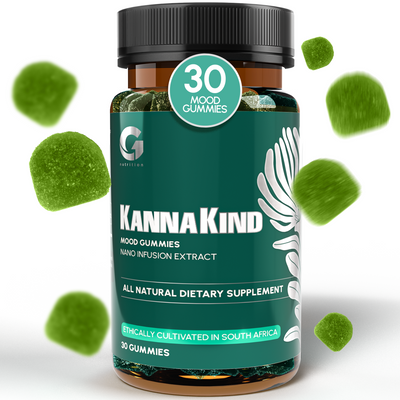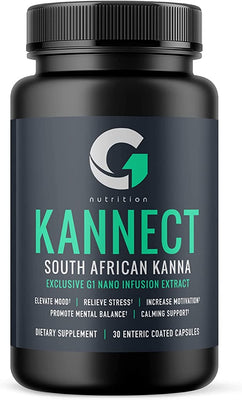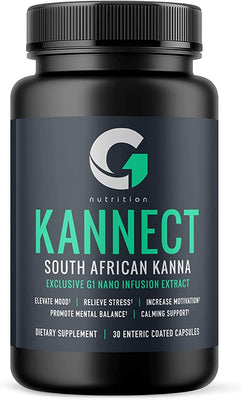You may have heard whispers about a unique plant from South Africa called Kanna, or Sceletium tortuosum. It’s gaining attention as a natural supplement for those looking to find more balance, ease stress, and sharpen their mental clarity. But with so many herbal supplements on the market, it’s fair to ask: what’s the real story behind Kanna?
This article dives into the science and history behind this fascinating plant. We will explore its traditional roots, look at modern research on its benefits for mood and focus, and provide a clear-eyed view of what you can realistically expect. Our goal is to give you the information you need to decide if Kanna is a good fit for your wellness routine.
What Is Kanna (Sceletium tortuosum)?
Before we get into the latest studies, let’s cover the basics. Kanna is a succulent plant native to South Africa. For centuries, it has been a cornerstone of indigenous culture, valued for its unique effects on the mind and body. Unlike many modern supplements that are new to the scene, Kanna has a deep and rich history.
Origins and Traditional Use
Long before Kanna appeared in capsules and gummies, the indigenous Khoisan communities of South Africa recognized its value. They traditionally prepared the plant by fermenting and drying it, which was believed to enhance its properties. The resulting material, often called "kougoed" (meaning 'something to chew'), was chewed to relieve thirst, fight fatigue, and elevate mood.
These communities used Kanna to promote a sense of well-being, reduce stress, and foster social connection. It was a tool for enduring long journeys and a way to bring a feeling of calm and presence to daily life. This long-standing traditional use provides the foundation for the modern interest in Sceletium tortuosum.
Modern Popularity
So why is Kanna becoming so popular now? The search for natural ways to manage stress and improve mental performance has led many people to explore herbal supplements and natural nootropics. Kanna stands out because its historical use aligns perfectly with modern needs for mood support and cognitive focus.
As scientific interest has grown, researchers have started to investigate the active compounds in Kanna, primarily a group of alkaloids like mesembrine. This research is beginning to provide a scientific framework for the benefits that traditional users have reported for centuries. People are looking for effective, non-habit-forming ways to navigate the demands of a busy life, and Kanna has emerged as a promising option.
Evidence for Mood Benefits
One of the most compelling reasons people turn to Kanna is for its potential to support a positive mood and reduce feelings of anxiety. While traditional use points strongly in this direction, modern science is starting to catch up and explain how it works.
Clinical and Preclinical Studies
Several studies have explored Kanna's effects on mood. Much of the early research was preclinical, meaning it was done in lab settings or with animal models. These studies consistently showed that Kanna extracts could influence brain pathways associated with stress and mood regulation.
More recently, human clinical trials have started to provide stronger evidence. Some studies have found that participants taking a standardized Kanna extract reported improvements in mood, a greater sense of calm, and better sleep quality. While the body of research is still growing, the results are encouraging. It is important to note that many studies are small, and more large-scale trials are needed to confirm these findings. However, the existing evidence suggests Kanna has a measurable positive effect on emotional well-being.
Mechanisms Behind Mood Effects
How does Kanna actually work in the brain? The magic lies in its active alkaloids, with an alkaloid called mesembrine being the most studied.
Scientists have discovered that mesembrine acts as a serotonin reuptake inhibitor (SRI). Serotonin is a key neurotransmitter that helps regulate mood, happiness, and anxiety. By partially blocking the reabsorption of serotonin, Kanna helps keep more of it available in the brain. This is a similar mechanism to some prescription antidepressants, but Kanna’s action is generally considered to be milder and more nuanced.
Beyond its SRI activity, Kanna’s alkaloids also interact with other important brain systems, helping to create a balanced effect that supports a calm yet alert state. This multi-target action is what makes Kanna a unique tool for mood support.
Evidence for Cognitive Focus and Energy
Beyond feeling good, many users are interested in Kanna for its potential as a natural nootropic—a substance that may help enhance cognitive function. The goal isn’t just to feel calm, but to feel calmly focused and mentally sharp.
Study Findings on Mental Clarity and Attention
Research into Kanna’s cognitive benefits is newer but equally promising. Some clinical trials have shown that supplementation with Kanna extract may improve cognitive flexibility, executive function, and processing speed. Participants in these studies were able to perform certain mental tasks more efficiently after taking Kanna.
Featured Products
Anecdotal evidence from users often mirrors these findings. People report feeling less distracted, more "in the zone," and better able to tackle complex tasks without the jittery side effects associated with stimulants like caffeine. They describe the feeling not as a forced push, but as a gentle lift in mental energy and clarity.
Potential Mechanisms
The cognitive effects of Kanna are thought to be linked to another one of its key actions: PDE4 inhibition. Phosphodiesterase-4 (PDE4) is an enzyme that breaks down a messenger molecule in the brain involved in functions like long-term memory, wakefulness, and cognition.
By inhibiting PDE4, Kanna may help increase levels of this messenger, which can in turn support better communication between brain cells. This action is believed to contribute to the feelings of heightened alertness, improved focus, and enhanced mental energy that many users report. It's this dual-action—mood support via serotonin and cognitive support via PDE4—that makes Sceletium tortuosum such a versatile botanical.
Realistic Expectations vs. Hype
With any popular supplement, it’s easy for the marketing hype to get ahead of the science. It’s crucial to have realistic expectations for what Kanna can and cannot do. Kanna is a supportive tool, not a magic bullet.
What users can expect from Kanna supplements is a gentle, noticeable shift in their mental state. It often promotes a feeling of serene focus—a state where you feel relaxed but also alert and engaged. Many users find it helps take the "edge" off of a stressful day or quiet a busy mind.
It's not a sedative that will make you drowsy, nor is it a powerful stimulant that will give you an artificial jolt of energy. The experience is more subtle. For some, the effects are noticeable within an hour. For others, particularly with ongoing mood support, the benefits may build over several days of consistent use. Differentiating between scientifically supported benefits and exaggerated claims is key to using Kanna effectively and responsibly.
Safety, Warnings, and Dosing Tips
Like any active supplement, Kanna should be used with knowledge and respect. It is generally considered safe for most healthy adults when used appropriately, but there are important precautions and dosing guidelines to be aware of.
Common Side Effects and Precautions
When taken at standard doses, Kanna is well-tolerated by most people. However, some individuals, especially those new to the supplement or taking a high dose, may experience mild side effects. These can include:
- Mild gastrointestinal upset or nausea
- Headaches
- A feeling of being slightly overstimulated or edgy (usually with higher doses)
These effects are typically temporary and often resolve by lowering the dose. Listening to your body is the most important rule.
Drug Interactions and Who Should Avoid Kanna
This is the most critical safety information to understand. Because Kanna works on the serotonin system, it should NOT be combined with certain medications.
- SSRIs and MAOIs: Do not take Kanna if you are on prescription antidepressants like SSRIs (e.g., Prozac, Zoloft) or MAOIs. Combining them can lead to a dangerous condition called serotonin syndrome.
- Other Psychiatric Medications: If you are taking any medication for anxiety, depression, or other psychiatric conditions, consult your doctor before trying Kanna.
- Pregnancy and Nursing: There is not enough research on Kanna's safety during pregnancy or while breastfeeding. It is best to avoid it during these times.
- Sensitive Populations: Individuals with known medical conditions should always consult a healthcare professional before adding any new supplement to their regimen.
Recommended Forms and Dosage Guidance
Kanna is available in several forms, each with its own characteristics.
- Chewables and Gummies: These offer a convenient and tasty way to take Kanna. Products like KannaKind Gummies are pre-dosed and easy to integrate into your day.
- Capsules: Encapsulated extracts, such as KANNECT Kanna supplements, provide precise, standardized doses. This is ideal for those who want to track their intake carefully.
- Teas: Brewing dried Kanna into a tea is a more traditional method. The effects may be milder and take longer to onset.
- Nano-Infused Forms: Advanced extracts use nanotechnology to create smaller particles, which may enhance absorption and allow the effects to be felt more quickly.
For dosing, the golden rule is to start low and go slow. A typical starting dose of a standardized extract is around 25 mg once or twice a day. You can see how your body responds and gradually increase if needed. Pay attention to how you feel and find the lowest effective dose for you.
Practical Tips for Using Kanna
Integrating Kanna into your daily life is simple, but a few tips can help you get the most out of it.
- Timing is Key: Consider your goals. If you're using Kanna for focus during the workday, taking it in the morning or before a big task might be best. If you're looking for relaxation, an afternoon or early evening dose may be more suitable.
- Combine with Healthy Habits: Kanna works best as part of a holistic approach to wellness. Its benefits can be amplified when combined with good sleep, regular exercise, a balanced diet, and mindfulness practices like meditation.
- Create a Routine: Consistency can be important, especially for ongoing mood support. Taking Kanna at the same time each day can help maintain a stable level of its active compounds in your system.
Summary: Evidence-Based Takeaways
So, can Kanna really improve mood and focus? The available evidence from both traditional use and modern research is promising.
- For Mood: Kanna appears to be an effective tool for mood support, helping to promote a sense of calm and well-being, largely through its action on the serotonin system.
- For Focus: Its potential to act as a PDE4 inhibitor suggests it can support cognitive focus, mental clarity, and sustained energy without jitters.
- Safety First: Kanna is generally safe but comes with critical warnings. It should never be mixed with SSRIs or MAOIs. Always start with a low dose and consult a healthcare provider if you have any medical conditions or are on other medications.
The bottom line is that Sceletium tortuosum is a valuable herbal supplement with a unique dual action on mood and cognition. For the everyday user looking for a natural way to manage stress and sharpen focus, Kanna offers a compelling, evidence-backed option.



